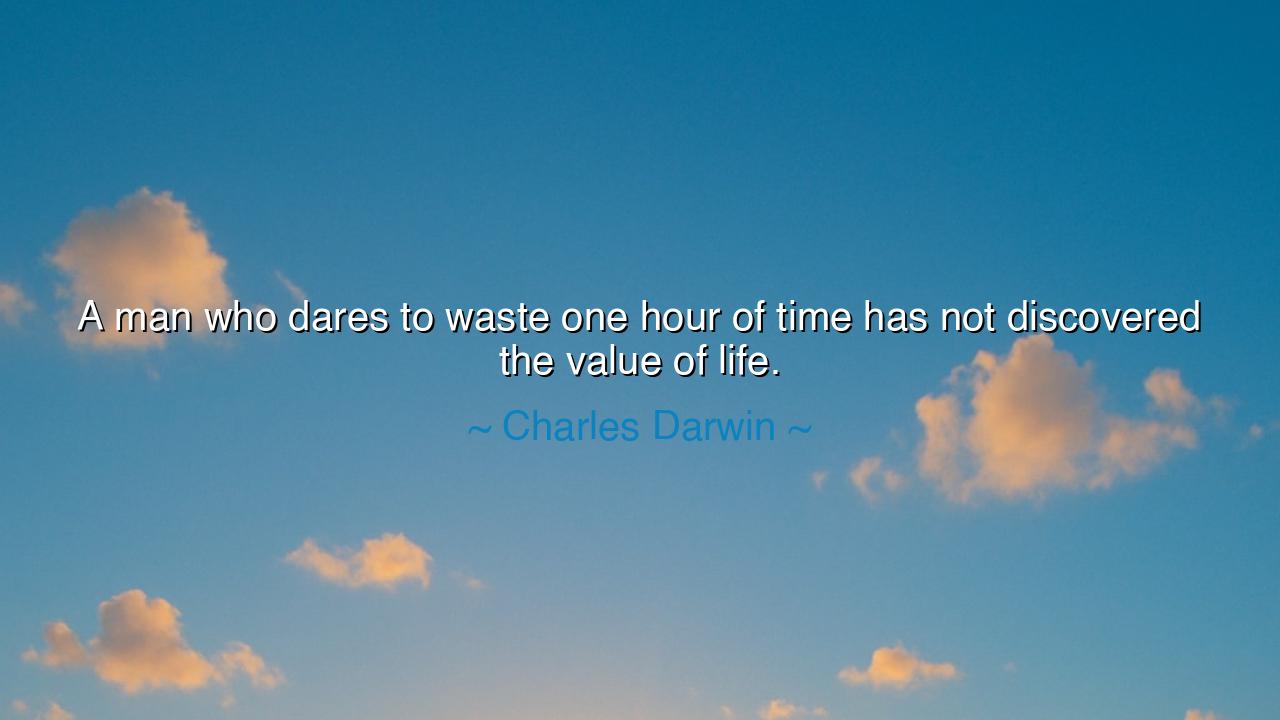
A man who dares to waste one hour of time has not discovered the






“A man who dares to waste one hour of time has not discovered the value of life.” Thus spoke Charles Darwin, the patient observer of creation, the seeker of nature’s deepest secrets. In this solemn truth, Darwin offers more than a lesson in time — he offers a reflection on existence itself. For to him, life was not an idle passage between birth and death, but a sacred journey — brief, fragile, and filled with infinite wonder. To waste even a single hour, he believed, was to deny the miracle of being alive, to squander the most precious currency ever granted to the human soul: time.
Darwin spoke these words not from haste or ambition, but from reverence. He was a man who spent his life in observation — watching the silent flight of finches, the patient unfolding of flowers, the endless struggle of life to survive and evolve. Through this, he came to understand that all living things are bound by the same law: that time is the measure of existence, and every moment wasted is a moment lost forever. His study of life was also a study of time — how, over ages, species rise and fall, how each heartbeat is the echo of a thousand generations before it. For Darwin, to waste time was not merely laziness; it was ingratitude to life itself.
Think, my child, on what it means to waste an hour. An hour may seem small, yet in its passing lies the power to change the world. The great discoveries of humanity, the works of art that stir the soul, the words that outlive their speakers — all were born of moments that others might have thrown away. The philosopher who contemplates truth, the mother who teaches her child, the craftsman who perfects his art — each redeems the hours given to them. Time, unlike gold, cannot be mined or stored. It flows, silent and relentless, and the wise learn to honor its passing by filling it with purpose.
History offers countless examples of those who understood this sacred truth. Consider Leonardo da Vinci, the painter, inventor, and visionary. He filled his every waking hour with curiosity — studying anatomy, sketching machines, observing birds in flight. His notebooks overflowed with ideas centuries ahead of their time. To him, idleness was a form of death, for his spirit lived only in the pursuit of knowledge. Even on his deathbed, he lamented, “I have offended God and mankind because my work did not reach the quality it should have.” Such was his reverence for time — that even a lifetime of genius felt too short to satisfy the hunger of the mind.
Yet Darwin’s words are not meant to burden us with endless toil, but to awaken awareness. He does not tell us never to rest, but never to live thoughtlessly. Time well spent is not always filled with labor; it can also be filled with wonder — the quiet joy of watching a sunrise, of listening to a friend, of being present in one’s breath. What he warns against is not rest, but waste — the dull, unconscious drifting of hours that neither nourish the mind nor uplift the spirit. To live without intention, to pass one’s days in trivial pursuits, is to die slowly while still breathing.
The ancients knew this truth well. The Roman philosopher Seneca wrote, “It is not that we have a short time to live, but that we waste much of it.” Life, he said, is long enough for those who know how to use it. The wise man, like the gardener, knows that time is the soil in which destiny grows. Each hour is a seed, and the harvest depends on how we tend it. To neglect one’s time is to leave the field barren; to use it well is to ensure that one’s life, however brief, blooms with meaning.
So, my child, remember Darwin’s warning as a flame to guide you: do not waste the gift of your hours. Spend them as the artist spends color — with care, with vision, and with reverence. Rise each day with purpose, however small: to learn something new, to help another, to build, to grow, to wonder. Let no hour pass unnoticed, for it will never return. Time, once gone, leaves only the shape of your deeds behind.
And when the twilight of your life approaches, may you look back not with regret for what was wasted, but with gratitude for what was lived. For in the end, the value of life is not measured in years, but in moments made meaningful. Thus spoke Darwin — and through his words, we learn that the greatest discovery a man can make is not of nature, but of himself, in the precious, vanishing mystery of time.






AAdministratorAdministrator
Welcome, honored guests. Please leave a comment, we will respond soon